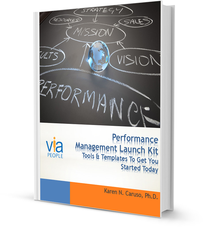The Clock is Ticking...5 Ways to Get Performance Reviews Done on Time
Employee performance reviews are one component of the employee performance management process but they are an important part. Completing performance review and holding meaningful performance review discussions gets a lot of attention during certain times of year from managers who need to complete them and HR leaders who need to ensure they get done.
 Employee performance reviews serve to provide a formal summary of an employee’s performance over a given period of time. It is an important opportunity for the employee and manager to have a discussion regarding past performance, strengths and development needs, goals for the coming year and future career plans. Unfortunately, the completion of performance reviews often gets assigned a low priority by many managers. Managers may avoid completing reviews and holding review discussions for a variety of reasons, including: not having the requisite skills to evaluate and provide feedback, discomfort with conflict, the inability to prioritize their workload, or lastly they just don’t see the value.
Employee performance reviews serve to provide a formal summary of an employee’s performance over a given period of time. It is an important opportunity for the employee and manager to have a discussion regarding past performance, strengths and development needs, goals for the coming year and future career plans. Unfortunately, the completion of performance reviews often gets assigned a low priority by many managers. Managers may avoid completing reviews and holding review discussions for a variety of reasons, including: not having the requisite skills to evaluate and provide feedback, discomfort with conflict, the inability to prioritize their workload, or lastly they just don’t see the value.
Managers also may not understand the negative consequences of not completing performance reviews on time. Not completing performance reviews in the designated timeframe sends a clear message to employees that their performance is not a priority. This dynamic can quickly erode the employee-manager relationship and lead to poor engagement and retention issues.
Get Performance Reviews Done…On Time
1. Align the performance review period with the normal business cycle.
My colleagues and I have heard every excuse known to man for not getting performance reviews completed. Most of the reasons offered by managers are related to time. As such, considering the time in the year when formal reviews are completed can make a big difference. We often align the performance review process with other year end closing and future budgeting and planning activities. We have worked with many organizations who have successfully adjusted the time line for performance reviews by scheduling them earlier in the year so that they become a single focus during a given time period. Performance reviews are completed well in advance of budget meetings, holiday time off and the closing of the books. Just think of how fabulous that would be.
2. Recognize positive performance.
We all appreciate being recognized for a job well done. Recognition reinforces effective behavior and serves to motivate us to continue that behavior. Find ways to highlight the progress of those managers or departments who are completing performance reviews ahead of schedule. Consider public communication on the progress that the organization is making throughout the performance review process with special attention to those who are setting a positive example. Some organizations take it a step further by offering an appropriate reward to role model managers such as a gift card or department social event. Do what fits with your company's culture.
3. Hold managers accountable for managing performance.
Setting goals, providing regular feedback on performance and ongoing coaching are part of a manager’s job responsibilities. Managers who are held accountable for managing and developing talent will likely see the completion of the performance review as an important task. Consider making the completion of regular coaching sessions and timely performance reviews one of the formal goals upon which managers will be evaluated in their own performance review. Some organizations make the on-time completion of performance reviews as measurable goal on every manager’s performance plan for the year.
4. Move the performance review process online.
Performance management software can make the process of documenting feedback and completing performance review forms easier for managers. Software solutions like viaPeople’s Performance Management system can prompt managers with emails, integrate feedback from direct reports and peers, and provide them with the information they need to complete a thorough and accurate performance review – on time. Online solutions also make it easier for HR to track and monitor the process. Real-time reporting will offer visibility into the progress that managers are making in completing reviews, allow you to reach out to those who may be having issues and escalate issues, as necessary.
5. Set managers up for performance review success.
As discussed, one of the reasons why managers do not complete performance reviews on time is a lack of comfort with their skills in evaluating performance and providing feedback. We all tend to avoid doing things outside of our comfort zone. Organizations can support managers by providing just in time training and resources for managers to get the information they need, when they need it. Plan to offer refresher training to all managers as you launch the annual performance review process and encourage managers to attend.
Need ideas for launching a successful performance review process? Download our free launchkit.
Image courtesy of pakorn at FreeDigitalPhotos.net
Share this
You May Also Like
These Related Stories

4 Ways to Increase the Timely Completion of Performance Reviews

Tips for Effective Self-Evaluation in 360 Feedback



